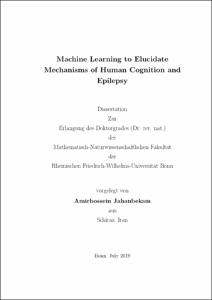Jahanbekam, Amirhossein: Machine Learning to Elucidate Mechanisms of Human Cognition and Epilepsy. - Bonn, 2020. - Dissertation, Rheinische Friedrich-Wilhelms-Universität Bonn.
Online-Ausgabe in bonndoc: https://nbn-resolving.org/urn:nbn:de:hbz:5-59711
Online-Ausgabe in bonndoc: https://nbn-resolving.org/urn:nbn:de:hbz:5-59711
@phdthesis{handle:20.500.11811/8812,
urn: https://nbn-resolving.org/urn:nbn:de:hbz:5-59711,
author = {{Amirhossein Jahanbekam}},
title = {Machine Learning to Elucidate Mechanisms of Human Cognition and Epilepsy},
school = {Rheinische Friedrich-Wilhelms-Universität Bonn},
year = 2020,
month = nov,
note = {Machine learning approaches, a branch of computer science based on the study of complex statistical algorithms, help researchers predict and discover facts about the outside world that may otherwise be too latent and sophisticated for more commonplace approaches.
Machine learning techniques are able to explore large amounts of data in a multivariate fashion, so that multiple factors comprising a phenomenon are analyzed simultaneously; a technique that human intelligence is not fully optimized for. Accordingly, machine learning is becoming a widely used assistive tool in many fields of science and technology.
In the same vein, the current thesis aims to methodize two main scientific questions within the realm of the neurosciences using machine learning frameworks. Here, machine learning is used to give a viable solution for decoding ongoing brain activities in cognitive studies using data obtained via intracranial electroencephalography (iEEG). IEEG data, represented as a 3D model is proposed, allowing the data to be broken down into distinct bins of information, and in addition, to be able to identify and discard non-informative components. Combining this data modeling approach with suitable machine learning algorithms, facilitates the procedure of interpreting brain activity and enables a traceable and plausible pattern classification solution.
Regarding the second scientific question, machine learning is implemented to aid epilepsy patients in tracking and recording their seizures. In order for patients with epilepsy to receive adequate counseling and treatment, accurate documentation of seizure activity is required, however research has shown that self-reporting of seizure activity is often fundamentally unreliable. In this thesis, extensive studies aiming to investigate this question were carried out and subsequently machine learning approaches are proposed to track and register the seizure activity of individuals with epilepsy based on bio-feedback signals. Additionally, an introduction to the state-of-the-art deep artificial neural networks is given; in addition to discussing the applicability of deep learning on natural neural data.},
url = {https://hdl.handle.net/20.500.11811/8812}
}
urn: https://nbn-resolving.org/urn:nbn:de:hbz:5-59711,
author = {{Amirhossein Jahanbekam}},
title = {Machine Learning to Elucidate Mechanisms of Human Cognition and Epilepsy},
school = {Rheinische Friedrich-Wilhelms-Universität Bonn},
year = 2020,
month = nov,
note = {Machine learning approaches, a branch of computer science based on the study of complex statistical algorithms, help researchers predict and discover facts about the outside world that may otherwise be too latent and sophisticated for more commonplace approaches.
Machine learning techniques are able to explore large amounts of data in a multivariate fashion, so that multiple factors comprising a phenomenon are analyzed simultaneously; a technique that human intelligence is not fully optimized for. Accordingly, machine learning is becoming a widely used assistive tool in many fields of science and technology.
In the same vein, the current thesis aims to methodize two main scientific questions within the realm of the neurosciences using machine learning frameworks. Here, machine learning is used to give a viable solution for decoding ongoing brain activities in cognitive studies using data obtained via intracranial electroencephalography (iEEG). IEEG data, represented as a 3D model is proposed, allowing the data to be broken down into distinct bins of information, and in addition, to be able to identify and discard non-informative components. Combining this data modeling approach with suitable machine learning algorithms, facilitates the procedure of interpreting brain activity and enables a traceable and plausible pattern classification solution.
Regarding the second scientific question, machine learning is implemented to aid epilepsy patients in tracking and recording their seizures. In order for patients with epilepsy to receive adequate counseling and treatment, accurate documentation of seizure activity is required, however research has shown that self-reporting of seizure activity is often fundamentally unreliable. In this thesis, extensive studies aiming to investigate this question were carried out and subsequently machine learning approaches are proposed to track and register the seizure activity of individuals with epilepsy based on bio-feedback signals. Additionally, an introduction to the state-of-the-art deep artificial neural networks is given; in addition to discussing the applicability of deep learning on natural neural data.},
url = {https://hdl.handle.net/20.500.11811/8812}
}






